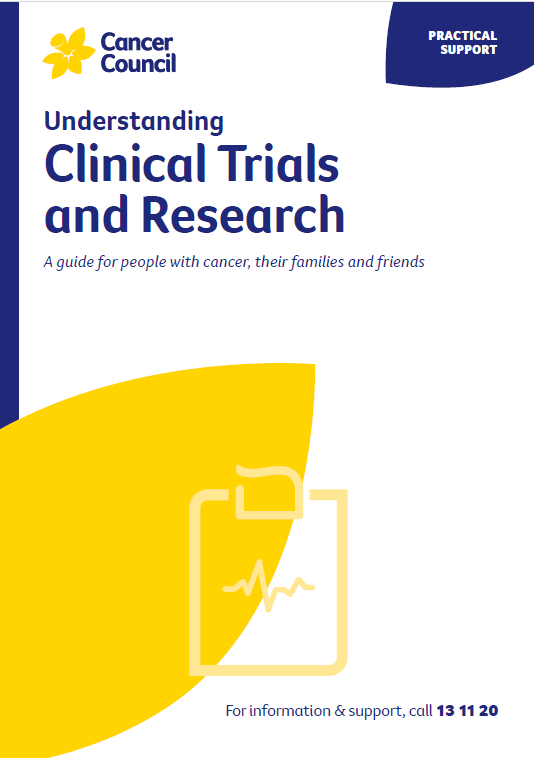- Home
- About Cancer
- Cancer treatment
- Clinical trials and research
- Joining a trial or study
- Deciding to take part
Deciding to take part
You may have many questions when deciding whether to join a clinical trial. As well as talking to your doctor and clinical trials nurse, it is a good idea to talk to people close to you, such as your family, carers or close friends. Ultimately, though, it’s your decision to participate in research or not to participate.
Learn more about:
- Overview
- Weighing up the benefits and risks
- Getting a second opinion
- Video: Why you shouldn’t be afraid of clinical trials
Overview
You shouldn’t feel pressured to take part in research, and you should not feel rushed into making any decisions that may affect your health or treatment. Ask your doctor or nurse how much time you have to think about whether or not to join a study. You should usually be given at least a few days to consider the participant information.
If you would like to take more time to think about it, ask if it is safe to wait a bit longer before starting treatment. If you decide not to join a study, you will still receive the standard treatment for the cancer, and it won’t affect your relationship with your treatment team.
Weighing up the benefits and risks
- Consider what is most important to you. Some people prefer to have standard treatment with predictable side effects, whereas others want to try something new even if the benefits are not yet proven or it may have unknown side effects.
- Think about how the study might affect your health, wellbeing and lifestyle. What is the chance of any serious side effects? Will any parts of the study be too difficult (e.g. having to have extra tests or trips to the hospital)?
- Weigh up these drawbacks and risks against the possible benefits, such as a possibly longer survival time or not having to experience certain side effects.
- Remember that everyone’s situation is different – what is the right decision for someone else may not be right for you.
Getting a second opinion
Some people like to get a second opinion about whether they should join a research study, particularly if it is a clinical trial.
A second opinion can:
- confirm or clarify your doctor’s recommendations
- help you to consider all the advantages and disadvantages of being on the trial
- reassure you that you have thought about the different issues that might affect you.
If you would like to get a second opinion, ask your general practitioner (GP) for a referral to another cancer specialist, but keep in mind that you may have to wait several weeks for an appointment and you may have to pay extra.
You can also ask your cancer specialist if it is possible to talk to another specialist within the same hospital or treatment centre. Some people also like to discuss the possibility of a trial with their GP.
→ READ MORE: Who can join a study?
Video: Why you shouldn’t be afraid of clinical trials
Dr Elizabeth Hovey explains why patients and their families shouldn’t be afraid of a clinical trial, but see it as a potential treatment opportunity.
Podcast: Making Treatment Decisions
Listen to more episodes from our podcast for people affected by cancer
More resources
All updated content has been clinically reviewed by A/Prof Brett Hughes, Senior Staff Specialist, Medical Oncology, Royal Brisbane and Women’s Hospital and The Prince Charles Hospital, and Associate Professor, The University of Queensland, QLD. This edition is based on the previous edition which was reviewed by the following panel: A/Prof Brett Hughes (see above); Christie Allan, Clinical Trials Lead, Cancer Council Victoria, VIC; Dawn Bedwell, 13 11 20 Consultant, Cancer Council Queensland, QLD; Joanne Benhamu, Senior Research Nurse, Team Lead, Lung, Colorectal and Palliative Care Trials, Parkville Cancer Clinical Trials Unit, Peter MacCallum Cancer Centre, VIC; Louise Dillon, Consumer; Sabina Jelinek, Clinical Nurse Research, St John of God Murdoch Hospital, WA; Chloe Jennett, Program Coodinator, Cancer Research, Cancer Council NSW; Carmel McCarthy, Consumer; Alison Richards, Research Unit Manager, Medical Oncology Clinical Trials Unit, Flinders Medical Centre, SA; Prof Jane Ussher, Translational Health Research Institute (THRI), School of Medicine, Western Sydney University, NSW; Prof Janette Vardy, Medical Oncologist, Concord Cancer Centre, and Professor of Cancer Medicine, The University of Sydney, NSW.
View the Cancer Council NSW editorial policy.
View all publications or call 13 11 20 for free printed copies.

